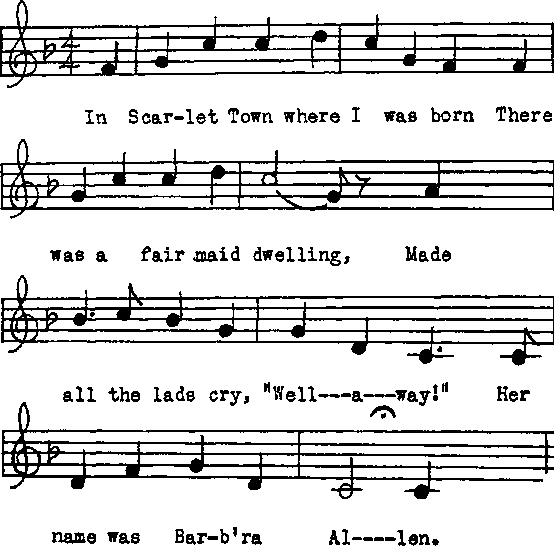Barbara Allen- Hopkins (IN) 1935 Brewster D
[From: Brewster; Ballads and Songs of Indiana, 1940. Most of the ballads were collected in 1935 and 1936.
R. Matteson 2012]
15. BARBARA ALLEN (Child, No. 84)
"Barbara Allen" easily ranks first among Indiana ballads in point of number of versions recovered. Fourteen texts have been collected, ranging in length from seventeen stanzas to two. The ballad is known in this state as "Barbara Allen" or "Barbary Allen."
Both the A and B versions of Child are found, and sometimes there are combinations of the two. The hero appears as "Sweet William," "Young William," "Jemmy Groves," "Johnnie Green," and "Willie Green." The "rose-and-brier" ending occurs in eight of the versions.
For American texts, see Barry, No. 22; Barry, Eckstorm, and Smyth, p. 195; Campbell and Sharp, p. 90; Cox, p. 96; Davis, p. 302 and p. 577; Hudson, No. 13; Hudson, Folksongs, p. 95; Journal, VI, 132; XIX, 286; XX, 256; XXII, 63; XXVI, 352; XXVIII, 144; XXIX, 160,198; XXX, 317; XXXV, 343; XXXIX, 97, 211; XLII, 268, 303; XLVI, 28; XLIX, 207-8; Jones, p. 301; Greenleaf and Mansfield, p. 26; Mackenzie, Ballads, p. 35; Mackenzie, p. 100; McGill, p. 39; Pound, Ballads, p. 7; Sandburg, p. 57; Scarborough, p. 59; Scarborough, Song Catcher, p. 83; Shearin, p. 3; Shearin and Combs, p. 8; Smith, pp. 13, 20; Smith, Ballads, p. 129; Thomas, p. 94; Wyman and Brockway, p. 5; Randolph, The Ozarks, pp. 183-85; Smith and Rufty, American Anthology, pp. 30-36; Cambiaire, East Tennessee and Western Virginia Mountain Ballads, pp. 66-6$; Fauset, Folk-Lore from Nova Scotia, p. 113; BFSSNE, X, 23-24 (Maine); PTFLS, X, 146; Neely, Tales and Songs of Southern Illinois, pp. 138-39; Gordon, Folk-Songs of America, p. 69; Henry, Folk-Songs from the Southern Highlands, p. 80.
British: Greig, Last Leaves, pp. 67-70; Williams, Folk-Songs of the Upper Thames, pp. 204, 206; JFSS, I, 111, 265; II, 15, 80; Journal of the Irish Folk-Song Society, I, 45
D. "Barbara Allen." Contributed by Mrs. A. J. Hopkins, of Boonville, Indiana. Warrick County. April 18, 1935. With music. Sung by Miss Hopkins; noted by Miss Wilkin

1. In Scarlet Town where I was born
There was a fair maid dwelling,
Made many a youth cry "well-a-day";
Her name was Barbara Allen.
2. 'T was early in the month of May
When the green buds were a-swelling,
Young William on his deathbed lay
In love with Barbara Allen.
3. He sent a servant to the place
Where Barbara was a-dwelling:
"My master says for you to come there
If your name be Barbara Allen."
4. Then slowly, slowly she rose up
And slowly she went to him,
But the only words she had to say
Were, "Young man, I think you're dying."
5. "I know I'm sick and very sick
And death is in me dwelling,
And I shall never see my time again
If I don't get Barbara Allen."
6. "I know you're sick and very sick
And death is in you dwelling,
And you never will see your time again,
For you won't get Barbara Allen.
7. "You remember on the other day
When you were all a-drinking
You filled your glass and you handed it around,
And you slighted Barbara Allen."
8. He turned his pale face to the wall;
He turned his back upon her:
"Adieu, adieu, to the ladies all,
And woe unto Barbara Allen."
9. She mounted on her milk-white steed
And she rode through town a-sailing,[1]
And every house that she passed by
Said "Woe unto Barbara Allen!"
10. She scarce had gone one mile from town
When she heard the death-bell tolling;
She looked to the east and she looked to the west
And she spied the cortege [2] coming.
11. "O Mother, Mother, make my bed,
And make it soft and narrow;
My truelove died for me today,
And I'll die for him tomorrow."
12. They carried them both to the old churchyard;
They buried them both together.
And out of his grave there grew a wild rose
And out of hers a brier.
13. They grew so high and they grew so tall
That they could not grow any higher;
Then they wound themselves in a truelove knot,
And the rose twined round the brier.
1. This is an unusual touch, and an interesting one.
2. Literary influence seems evident here.